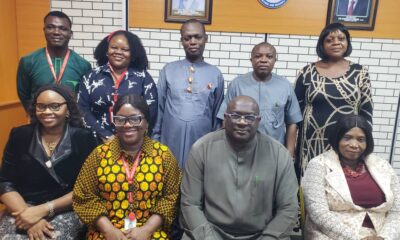Business
Senators Disagree On Bill To Establish Financial Intelligence Centre
Senators have disagreed on
whether the Bill for an Act to establish Nigeria Financial Intelligence Centre (NFIC) should be passed or rejected.
The Bill, which is seeking to establish the centre as a separate agency, independent of the Economic and Financial Crimes Commission (EFCC) had passed second reading at the upper legislative chamber.
It proposes that the centre should be a central body responsible for receiving, requesting, analysing and disseminating financial intelligence reports to relevant agencies in the country.
The Chairman of the Committee on Drugs, Narcotics, Financial Crimes and Anti-Corruption, Sen. Victor Lar, had explained that the objective of the Bill was to vest the proposed centre with full independence and autonomy.
He said the autonomous status being sought for the proposed centre would insulate it from undue interference and manipulation by other authorities as well as strengthen its capacity to effectively deliver on its mandate.
But the Chairman, Committee on Rules and Business, Sen. Ita Enang, opposed the passage of the Bill, saying that it would amount to duplication of EFCC functions.
Enang argued that before the NFIC Bill could be passed, some sections of the EFCC Act must be repealed or amended to avoid conflict.
He said that most of the countries that had an equivalent of EFCC did not have an independent financial intelligence centre as was being proposed for Nigeria.
“I am conscious that this is an Executive Bill. I will only draw attention of the Senate to existing Acts; passing this Bill will amount to repetition of the laws.
“The same people who make up the board of EFCC also make up this board. There are so many service bodies in the financial sector and there are series of others proposed by the Central Bank of Nigeria.
“All these are income consuming. Therefore, it will not add anything substantial to the economy of this country.
“EFCC is working and the financial intelligence unit is the core unit of EFCC. If we remove this unit and make it an agency, what will remain of the EFCC?” he argued.
On his part, Sen. Sadiq Yar’adua wondered why the NFIC should be an independent agency, arguing that most advanced countries had the financial intelligence centre domiciled in their anti-corruption agencies.
The Deputy President of the Senate, Sen. Ike Ekweremadu, said that based on the concerns raised by Enang on the seeming conflict with the extant laws, the senate would find a way to remove such conflict.
Sen. Aloysius Etuk stressed the need for the senate to do everything necessary to combat corruption, arguing that the EFCC lacked the capacity to access financial intelligence reports to tackle corruption.
The Senate President, Sen. David Mark, said that the bill was desirable but that the challenge before the upper chamber was whether the centre should be domiciled in the EFCC or stand as an independent agency.
Mark subsequently ruled that further activities on the Bill should be deferred to another legislative day.
Business
Abolish Multiple Taxation In Rivers, Group Urges Govt
Business
MDAs, Presidency Spend N1.9bn On Trips, Trainings In France
Business
NCDMB, ARPHL, Others Partner On Refinery Project
-

 Niger Delta9 hours ago
Niger Delta9 hours agoRSG, MWAN Strengthen Partnership To Improve Healthcare
-
Business6 hours ago
Abolish Multiple Taxation In Rivers, Group Urges Govt
-
Politics7 hours ago
PDP Tackles Okpebholo Over Alleged Dwindling IGR In Edo
-

 News10 hours ago
News10 hours agoFubara Urges Rivers People To Remain Peaceful, Law-abiding …As Eze Worlu-Wodo Inaugurates Palace For Akpor Kingdom
-
Business6 hours ago
IWD: DBN Disburses N272b To Women Businesses
-

 Niger Delta8 hours ago
Niger Delta8 hours agoNACA Debunks Fake HIV Drug Pricing News
-
Business6 hours ago
MDAs, Presidency Spend N1.9bn On Trips, Trainings In France
-
Politics7 hours ago
You’re Democratic Accountability Agents, Diri Tells Journalists

